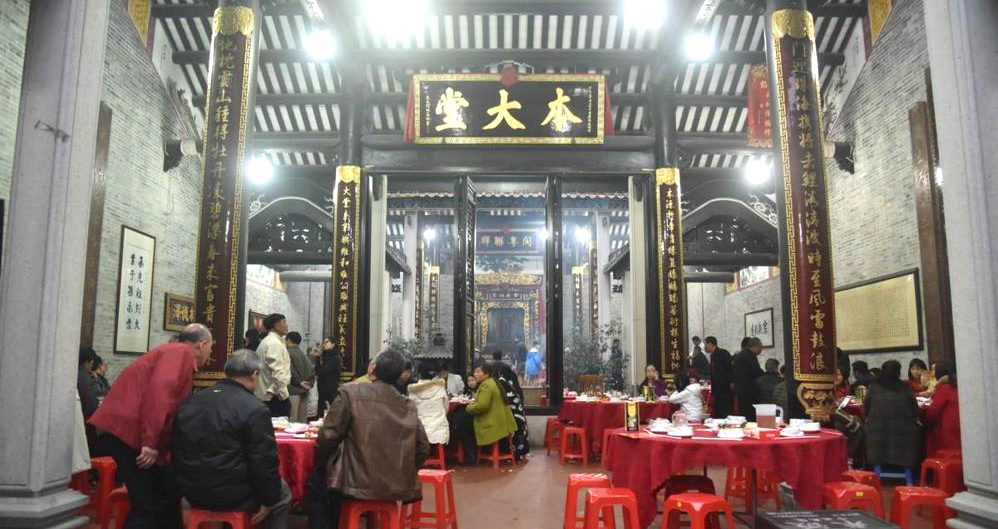An integrated view of political anthropology

The big Lin family in Guangzhou dine in their ancestral hall. In local politics, especially village politics, kinship still plays an important role in the power structure in many rural areas. (PHOTO: CHINA.COM)
The changing geopolitical situation is leading to further division and reorganization of regional political units and activities. This trend, combined with the tension caused by globalization and the emergence of multinational organizations, has added dimensions to the study of political anthropology.
In the 1960s, political anthropology shifted from a comprehensive study of political structures to the analysis of political factors, such as political parties, sects and strategies, said Fan Ke, a professor from the school of sociology at Nanjing University. Out of concern for social changes, there are now two main research orientations in the field of political anthropology: the direct face-to-face interactions among certain people and the community in which this encounter occurs.
Dong Jianhui, a professor of anthropology and ethnology at Xiamen University, said political anthropology has also begun to explore various political challenges in the contemporary world and how the power system functions within the framework of modern countries because of the acceleration of economic globalization.
Since the 21st century, transnational population mobility has accelerated. He Guoqiang, a professor from the School of Sociology and Anthropology at Sun Yat-sen University, focused on three topics: what are the problems encountered in the identity, language and management conventions in the process of building a common political cause; finding ways to deal with the political symbols and the subordination caused by the factors that inhibit territorialization; and finding ways to cooperate within the framework of sprawling bureaucracy.
Fan argued that under the dual influence of transnational mobility and the internet, the role of countries—formerly the centers of power—will be different from the past in terms of social control. The emergence of various transnational non-governmental organizations has, to some extent, played the role of social regulation and control. In this regard, he said national anthropology should be listed as a major research topic and that transnational organizations should be the object of political anthropology research.
Political anthropology also involves research topics on hot issues in today’s world, such as the response to modernization by tribal or small ethnic groups, and the challenges to the existing power structure posed by the rise of the feminist movement.
As research objects have changed with time, political anthropology has formed some unique research methods, mainly the method of participatory observation in anthropology. He said political anthropology integrates the theories of social and cultural anthropology, and political science, which emphasize the perspectives of observation, integrates concept groups and modeling. When political anthropology studies folk politics, small political groups in specific regions are the subject of investigation, so a research framework aligned along the center-periphery should be used.
Since the birth of Western political anthropology, related research has mainly focused on primitive societies without literary history or with little literature. Dong said as a traditional society with a long history of writing, China should carry out its own research based on first-hand materials collected from field investigations.
Fan added that in today’s world of information, even in the most remote areas, there is no politics that is completely out of touch with the outside world. He said today’s political anthropology aims to examine how the big, extrinsic political context affects this process by focusing on the “local” political processes.
Dong said local politics is a valuable research point. In local politics, especially village politics, kinship still plays an important role in the power structure in many rural areas. As a lineage organization in the anthropological sense, clans have played a unique role in maintaining order in the countryside during the more than 2,000 years of feudal rule in China.
Dong added that political anthropologists advocate that society is a unity composed of various connected cultural systems and factors. Politics is a manifestation of cultural factors in the field of power. It can be adequately interpreted in the larger social and cultural context while taking into consideration cultural systems, such as economy, marriage, religion and symbolism.
He also said that power phenomenon like the clan’s kinship-style society is rich in content and has been historically different from reality. They were necessary supplements to formal politics and were also supported or hindered by the latter. Despite complexity in forms, they can all be understood from the following perspectives: the evolution of political systems, the structure and function of power, the relationship between individuals and power (that is, the role of individuals in the process of centralization, safeguarding of rights and power), the legitimacy and the symbolic nature of power.
